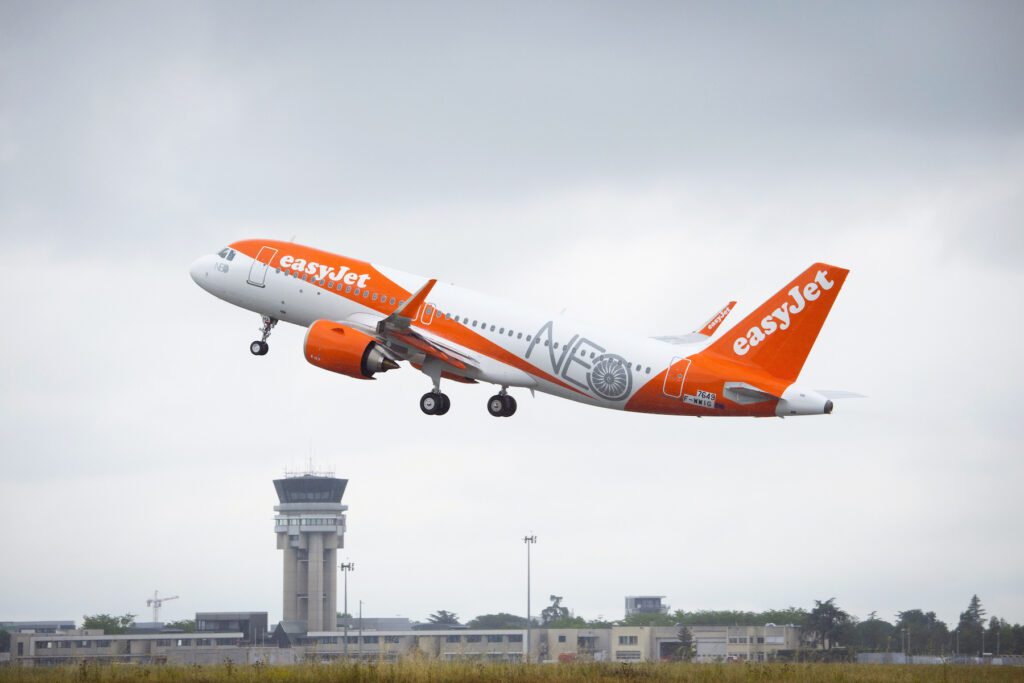
EasyJet is adding software upgrades to the flight management systems on its A320 fleet to enable the use of enable the use of “Descent Profile Optimisation” (DPO) and “Continuous Descent Approach” (CDA) for its pilots. (Photo: Airbus, S.A.S., by H. Gousse/master films)
EasyJet, the second largest U.K.-based low-cost airline, will modify its fleet of in-service Airbus A320 jets with a Flight Management System (FMS) software upgrade that will help its pilots reduce fuel burn, noise, and emissions during the approach phase into airports. The budget is also ready to trial AirFi’s in-flight entertainment and connectivity (IFEC) technology onboard a select fleet of its Switzerland-based A320s as well.
Here’s a look at the A320 upgrades and IFEC trial EasyJet has committed to, based on several recent announcements.
Descent Profile Optimization
EasyJet’s A320 family fleet will receive FMS software upgrades to enable the use of “Descent Profile Optimisation” (DPO) and “Continuous Descent Approach” (CDA). Both capabilities are enabled by a software upgrade to the performance database featured on the A320’s flight management computer, according to Airbus.
The two applications are provided by NavBlue, the navigation services division of Airbus. NavBlue enables the use of DPO on the A320 by reducing the margins used by the FMS to calculate and execute descent models. The use of DPO by A320 pilots can enable a longer cruise level and reduce the amount of deceleration needed during level-off, according to Airbus.
When used in combination with the DPO software upgrade, the use of CDA allows pilots to descend from cruise altitude using only idle engine thrust. Using DPO and CDA simultaneously can also maximize an airliner’s time spent at a fuel-efficient cruise level by not starting the descent too early.
Both software upgrades also improve the fuel efficiency of the descent profile by removing the “level-off” stage at the bottom of the descent when the aircraft’s engines generate thrust to maintain level flight in dense air prior to final landing approach.
“While our ultimate ambition is to achieve zero carbon emission flying, we must continue our focus on reducing the carbon emissions in our operation each and every day,” Captain David Morgan, easyJet’s interim COO, said in a press release. “That’s why this multi-million-pound investment is an important step in achieving a permanent reduction in the short-term which will see us operating the largest fleet of DPO and CDA enabled aircraft in the world. But one crucial element to reduce carbon emissions right now cannot be achieved by the industry alone, and so we are also calling on governments to introduce airspace modernisation right now, including finally implementing the Single European Sky.”
Based on where EasyJet operates within Europe and the number of flights they operate annually, Airbus estimates the airline could save more than 98,000 kg of fuel per year per aircraft across its network in Europe.
“This would subsequently reduce CO2 emissions by over 311 tons per year per aircraft, or 88,600 tons of CO2 each year for the entire A320 Family fleet,” according to Airbus.
Airbus expects to finish the upgrade of EasyJet’s FMS software to enable the use of DPO and CDA by the end of 2023.
AirFi Trial

EasyJet is doing a trial of the AirFi box on its Swiss fleet of Airbus A320s. (Photo: AirFi)
On the passenger-facing side of the EasyJet Airbus A320 fleet, the airline will start an initial trial of AirFi’s portable streaming technology, the AirFi box. The 2-kilogram box has an embedded server, ARM processor, and mass storage device that run off aircraft power to autonomously deliver wireless IFEC content to passenger mobile devices.
The trial will occur on a fleet of 27 total A320s that EasyJet has flying routes in Switzerland, between Geneva and Basel. AirFi CEO Job Heimerikx recently explained in a Connected Aviation Intelligence Podcast interview how his company’s technology is enabling a “mall in the sky” concept of operations for airlines that invest in it.
“We selected AirFi to work with us having been impressed by their overall capabilities and the flexibility of their systems and platforms,” Simon Cox, director of in-flight retail at EasyJet, said in a statement. “We are confident they are the right partners to support us in realising our ambitions to deliver an industry-leading, digital onboard experience for our customers across Europe.”